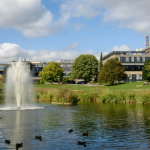International Development with Economics | University of Bath
Learn about global development from a heterodox economics perspective, and gain the skills to work in economic and development policy and practice.
How does the programme provide content to ensure students achieve an understanding of a reasonably diverse set of perspectives on understanding economies?
A core module in Semester 1 entitled "Economics for International Development" incorporates foundations of neo-classical thinking from the critical perspective of social economics and institutional perspectives (including Ha-Joon Chang's work in particular). For the module of assessment, students have to produce a market study of their choice showing the impact of the market on the market's Socio-Ecological System (Ostrom). Finally, students needs to do one book presentation out of a pluralist set of economists, which this year includes Stiglitz, Mazzucato, Piketty, Kelton and Raworth.
In Semester 2, the core teaching on the Global Political Economy module keeps incorporating a pluralistist perspective applied to the pratical coursework that needs to be produced (essay and report).
How does the programme ensure students understand the interaction between economic and ecological systems?
Ostrom's work on SES and managing the Commons is introduced in Semester 1 and is part of the requirements for the main coursework in Semester 1. Raworth (2017) is also taught in Semester 1.
The core module in Semester 2 covers a range of areas linked to environmental politics, financialistaion, global inequality, international agreements and so on.
How does the programme ensure students understand how to critically explore real-world evidence, both qualitative and quantitative?
The courseworks for the core modules of the programmes are built in such a way as to ensure that the taylor-made skills are developed for each student according to their academic and professional background, exploring either/or qualitative and quantitative skills. The programme offers to understand a practicum or a dissertation for completion of the MSc. Practicum opportunities are in INGOs, NGOs, private sector, governmental organisations, or academia.
What pedagogical approaches does the programme use to ensure that students examine the historical context, assumptions and values in all economic thinking?
The core Economics module in Semester 1 adds to its teaching the lectures priovided by Ha-Joon Chang from INET. A book review also allows you to have an in-depth understanding of the debate in Economics (e.g. Mazzucato, Chang, or Raworth).
How does the department ensure that the teaching culture and capacity to deliver economic pluralism are continually improving?
The course is based in the Department of Social and Policy Sciences which allows students to take options from the multi-disciplinary perspectives of International Development, including modules on Social Justice and Environmental Sustainability. Links to the undergraduate programme on International Development with Economics also allow students to join in during invited lectures from international experts in modules on Global Inequality: Economic and Political Perspectives, or The Social Sciences of Climate Change.
Other information:
The practical element of our programme, through its learning, assessments and practicum opportunities are really key to its success.
Country:
United Kingdom
University:
University of Bath
Course name:
International Development with Economics
Department/school:
Centre for Development Studies
Course level:
Taught Masters
Course language:
English

 all programmes
all programmes